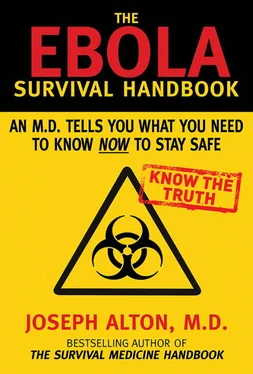Does your hospital have a plan of action in place to deal with a serious epidemic? Has it given adequate training to its staff, and will it provide the protective gear necessary for them to safely treat contagious patients? These are good questions to ask your local hospital’s administrator. If he or she answers “absolutely,” I still wouldn’t be convinced until they tell you how they reached that conclusion. If errors occurred at Texas Presbyterian, how is your local hospital any different?
I believe, in my heart, that the average hospital cannot handle the care of an Ebola or otherwise highly contagious patient. It’s not their main job; they’re used to medical problems like strokes, heart attacks, or injuries. There are very few hospitals that have the facilities and resources to ensure protection.
There are four high-risk infectious disease centers in the United States in Maryland (NIH), Atlanta (CDC), Nebraska, and Montana. I urge hospitals throughout the country to transfer all Ebola patients immediately to one of these centers. They are better equipped for the job.
WILL IT HAPPEN AGAIN?
In a recent article, CNN.comoffered seven reasons why a situation that occurred in the Dallas hospital where Thomas Duncan died would never happen again. Here’s the gist of what has been reported:
1. Duncan wasn’t hospitalized right away.This was a result of the failure in the chain of communication. Texas Presbyterian will think again before sending home any patient with a fever and a West African travel history. Hospitals all over the nation will likely be more on guard about doing the same. A higher index of suspicion will lead to fewer discharges from emergency rooms until more testing is done.
2. Duncan did not receive an experimental drug immediately.The difference between the care of Dr. Kent Brantley, Nancy Writebol, and Dr. Richard Sacra, and that of Thomas Duncan, is that because Brantley and Writebol were quickly diagnosed with Ebola, they were given the experimental ZMapp drug early in the course of the disease. Many attributed this to their successful recoveries (even though, honestly, we don’t know). Hopefully, a stockpile of ZMapp may become available in the future.
3. Duncan was given the wrong experimental drug.When he was finally diagnosed with Ebola, he was given a drug called brincidofovir, a drug designed to inhibit the ability of the Ebola virus to replicate itself. While brincidofovir is already in Phase 3 clinical trials, it’s not known whether it was not effective on Duncan because it simply didn’t work, or if it was administered too late to save him. Once trials are completed, it will be clearer whether brincidofovir is effective or not.
4. Duncan was not given a blood transfusion from an Ebola survivor. In addition to giving infected patients ZMapp, it is suggested that blood or plasma transfusions from Ebola survivors may help combat the disease in victims. It is not known why Duncan was not provided this option; though, at the time of this writing, reports confirm that Nina Pham has been given a donation of plasma from Dr. Kent Brantley. Perhaps going forward, other hospitals will follow suit.
5. Texas Presbyterian had no advance warning.Emory knew exactly what was coming to them when Dr. Brantley and Nancy Writebol were delivered there direct from being infected in Liberia. Thomas Duncan was, in effect, the first walk-in. Yet, I disagree here. We were given warnings about Ebola. Its mere presence in an area easily reached by air travel should have been the warning. Our top health administrators failed to adequately plan ahead.
TIP
“Infections are a leading cause of deaths and complications for nursing home residents and, with the exception of tuberculosis, we found a significant increase in infection rates across the board.”
Average citizens don’t spend a great deal of time thinking about what they would do in an epidemic, and what the local health center would do to protect their health. They expect our appointed health officials to plan for them, and by doing so, ensure their safety.
INFECTIONS ARE RAMPANT
Hospitals and, especially, nursing homes are not always safe when it comes to infections. In fact, there have been documented cases of otherwise healthy people being admitted for various procedures and becoming sick. These illnesses are called hospital-based infections. It isn’t the norm, but it’s more common than anyone really wants to believe.
In a recent Daily News article, Carolyn Herzig, of the Columbia University School of Nursing, explained that “Infections are a leading cause of deaths and complications for nursing home residents and, with the exception of tuberculosis, we found a significant increase in infection rates across the board.” Her team analyzed data submitted by nursing homes to the US Centers for Medicare and Medicaid Services between 2006 and 2010. They found rising rates of pneumonia, urinary tract infections, viral hepatitis, sepsis, wound infections, and multiple drug-resistant bacterial infections. Herzig believes, “Unless we can improve infection prevention and control in nursing homes, this problem is only going to get worse as the baby boomers age and people are able to live longer with increasingly complex, chronic diseases.”
To a slightly lesser degree, this goes for hospitals as well.
Usually younger, otherwise healthy people do not get sick in hospitals. While anyone admitted to a hospital could contract a health-care-associated infection, some groups are definitely more at risk than others, such as the very young and the very old. Those with chronic medical conditions like diabetes and those with immune deficiencies are also at risk.
TAKING RESPONSIBILITY… OR NOT
Following Thomas Duncan’s death, the CDC sent an alert to hospitals all over the country warning that: “Every hospital should ensure that it can detect a patient with Ebola.” While a perfectly reasonable statement, it didn’t outline a national policy for exactly how this should be accomplished. More importantly, it didn’t mandate national guidelines for every hospital when it comes to staff education and training, protective gear requirements, and isolation room procedures. Even procedures as basic as how to put on and take off hazardous material suits are different based on the brand.
The issue with all of this is that hospitals are so decentralized that they are, apparently, not required to listen to the CDC. A spokesman for the National Nurses United union, Charles Idelson revealed that few hospitals have provided adequate education for their employees. Idelson says most are simply pointing nurses to information on their websites, or linking to CDC information.
One of the main issues with this is that despite the recent onslaught of coverage in the media over Ebola, it truly is seen as a third-world issue, and US hospitals are generally more inclined to put their resources into areas where they know for sure a condition exists because it’s common to the population or the region. Think influenza in the wintertime in the Northeast.
Most hospitals already have systems in place for dealing with influenza outbreaks. They rely on these systems in the treatment of all highly contagious diseases, few if any of which have the death rate that Ebola has. As Dr. David Klocke, chief medical officer for Regional Health hospitals in South Dakota, explains, “We really are in general very well prepared to deal with dangerous microorganisms anyway.”
Some might take the above statement as comforting, but I look at it and wonder if there’s an aspect of arrogance in it. Is Dr. Klocke saying that his medical center can handle a community-wide Ebola outbreak? Given the circumstances, it would be a miracle if even the CDC could do so.
Читать дальше



![John Stieber - Against the Odds - Survival on the Russian Front 1944-1945 [2nd Edition]](/books/405234/john-stieber-against-the-odds-survival-on-the-russian-front-1944-1945-2nd-edition-thumb.webp)








